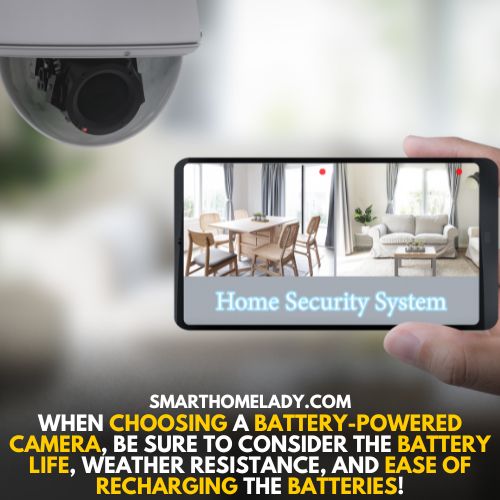If you’re considering investing in a wireless security camera, one of the questions that may be on your mind is whether or not it requires batteries.
As an expert in the field of security cameras, I’m here to answer that question for you.
First off, let’s clarify what we mean by ‘wireless’ security cameras. These are cameras that don’t require a physical connection to your home’s electrical system or internet network – instead, they operate using radio waves and can connect to your home Wi-Fi network.
So when it comes to power supply, there are two main options: battery-powered or wired (using a power cord). In this article, we’ll focus specifically on the first option: do wireless security cameras need batteries?

Contents
- 1 How do wireless security cameras get power? 4 Options
- 2 How long does wireless security camera batteries last? 3-6 Months
- 3 Choosing The Right Battery For Your Camera
- 4 Maximizing Battery Life – Tips And Tricks
- 5 How long does wireless security cameras batteries last?
- 6 How do wireless home security cameras get power?
- 7 Do all wireless security cameras need to be plugged in?
- 8 Do wireless cameras record all the time?
- 9 What outdoor wireless security cameras have 2 year battery life?
- 10 Does wireless charging preserve battery life?
- 11 Conclusion
How do wireless security cameras get power? 4 Options
Wireless security cameras are a popular choice for homeowners because of their convenience and ease of use. Wireless cameras don’t require a physical connection to a power source, unlike traditional wired cameras.
Wireless security cameras can be powered in a variety of ways, including battery, solar, AC, and PoE. Choosing the right power source for your camera will depend on your specific needs and installation location.
So how do they get their power? Let’s take a look at a few options:
1. Do Wireless Security Cameras Need Batteries – Battery-powered cameras
The answer is yes; wireless security cameras need batteries. Battery-powered cameras are a common type of wireless security camera. These cameras use rechargeable batteries to power the device.
The advantage of battery-powered cameras is that they can be placed anywhere without the need for wires or a power source. This makes them ideal for outdoor use or for areas where there is no easy access to power.
One example of a battery-powered wireless security camera is the Arlo Pro 3. This camera features a rechargeable battery that can last up to six months on a single charge. It also has a weather-resistant design, making it ideal for outdoor use.
While battery-powered cameras are convenient, they do have some drawbacks. The batteries need to be recharged periodically, which can be a hassle.
Additionally, if the batteries run out while the camera is in use, the camera will stop working until the batteries are replaced or recharged.
Pros and cons of Battery powered security cameras
| Pros | Cons |
|---|---|
| Easy to install and use | Batteries need to be recharged periodically |
| Can be placed anywhere without the need for electrical outlets | Limited battery life may require more frequent recharging |
| Wireless design means no messy wires or cables | May not be as powerful as wired cameras |
| Portable and can be moved from one location to another easily | Limited field of view compared to wired cameras |
| Can continue recording during power outages or internet disruptions | May require additional costs for batteries and chargers |
So, wireless security cameras do need batteries in most cases, and battery-powered cameras are a popular choice for their convenience and flexibility.
When choosing a battery-powered camera, be sure to consider the battery life, weather resistance, and ease of recharging the batteries.

2. Solar-powered cameras
Another option for wireless security cameras is to use solar power. These cameras have a small solar panel that charges a built-in battery during the day, allowing them to operate at night without needing an external power source.
3. AC-powered cameras
Some wireless security cameras can be plugged into an AC outlet for power. This option is great for cameras that are located near an outlet or where there is easy access to power.
4. PoE-powered cameras
PoE (Power over Ethernet) is a technology that allows both power and data to be transmitted over a single Ethernet cable.
Some wireless security cameras can be powered using PoE, making installation and setup easier.
How long does wireless security camera batteries last? 3-6 Months
The lifespan of wireless security camera batteries depends on various factors such as usage, battery capacity, and weather conditions.
Generally, a good-quality battery can last up to 6 months or even longer with moderate usage. However, extreme weather conditions like high temperatures can significantly reduce their lifespan.
Wireless security camera batteries typically last between 3-6 months, depending on usage and battery quality. However, some companies offer longer-lasting batteries for their cameras.
Generally speaking, the overall lifespan of a wireless security camera battery is around 5 years.
It’s important to keep in mind that battery life can be affected by factors such as temperature and usage, so it’s always a good idea to check the manufacturer’s recommendations for optimal performance.
It’s always best to opt for a camera with rechargeable batteries or a solar-powered option to avoid the hassle of frequent battery replacements.
Choosing The Right Battery For Your Camera
When it comes to wireless security cameras, batteries are essential. Without them, your camera won’t be able to function properly and keep your home or office safe from intruders.
Various battery types available in the market can power your device for different lengths of time. To choose the right battery type for your camera, you need to consider its capacity and voltage requirements.
Some popular choices include alkaline, rechargeable NiMH, lithium-ion, and lead-acid batteries. Each has its own strengths and weaknesses when it comes to durability, reliability, and cost-effectiveness.

It’s important to regularly maintain your chosen battery type by keeping an eye on its charge level and replacing it before it completely drains out.
- Alkaline batteries – These are affordable but have a shorter lifespan compared to other options.
- Rechargeable NiMH batteries – They are eco-friendly and provide longer-lasting power than alkaline batteries.
- Lithium-ion batteries – These offer high energy density but may require specialized chargers due to their unique chemical properties.
- Lead-acid batteries – They store large amounts of energy but are bulky and expensive.
Choosing the right battery for your wireless security camera is crucial in ensuring optimal performance.
By considering factors like capacity and voltage requirements alongside maintenance needs such as regular charging cycles or replacement schedules, you can ensure that your investment stays protected over time.
Suggested Readings
- Is It Illegal To Tamper With Security Cameras?
- Can Security Cameras Be Stolen?
- Can Security Cameras See Inside Cars?
Maximizing Battery Life – Tips And Tricks
Maximizing the battery life of your security cameras is an important aspect of ensuring that your property is always protected.
Here are some tips and tricks that you can use to maximize the battery life of your security cameras:
- Choose the right camera – Choosing a camera that has a long battery life and is energy efficient is important. Look for cameras that use low power consumption technologies such as Wi-Fi and Bluetooth Low Energy.
- Optimize camera placement – Place your cameras in areas where they will capture the most footage without using too much energy. Avoid placing them in areas where there is a lot of movement or activity, as this will trigger the motion detection feature and drain the battery.
- Motion detection – Motion detection is a great way to conserve battery life. Set your camera only to record when it detects movement. This will save energy and prevent your camera from recording unnecessary footage.
- Adjust camera settings – Some cameras allow you to adjust the recording quality and frame rate. Lowering the quality and frame rate can help to conserve battery life.
- Use solar power – Consider using solar panels to power your security cameras. This is a great way to ensure your cameras are always powered and eliminates the need to replace batteries constantly.
- Use a battery backup – If you are using a battery-powered camera, consider using a battery backup. This will ensure that your camera always has a backup power source.
By using these tips and tricks, you can maximize the battery life of your security cameras and ensure that your property is always protected.
By following these tips and tricks, you can maximize your device’s battery life and avoid running out of power when you need it most.
Frequently Asked Questions FAQs
How long does wireless security cameras batteries last?
Generally, most wireless security cameras can last anywhere from 1-3 years. However, the battery life of wireless security cameras can vary depending on factors such as usage, the size of the battery, and the quality of the camera.
How do wireless home security cameras get power?
Wireless home security cameras can get their power from a variety of sources, including batteries, solar panels, or an electrical outlet. Some models come with rechargeable batteries, while others can be hardwired into the electrical system of your home.
Do all wireless security cameras need to be plugged in?
No, not all wireless security cameras need to be plugged in. Some models are battery-powered, while others come with a solar panel that can keep the battery charged.
However, there are some wireless security cameras that do require a power source, such as those that are hardwired into your home’s electrical system.
Do wireless cameras record all the time?
It depends on the camera. Some wireless cameras are designed to record continuously, while others only record when motion is detected. Some models also allow you to set up a schedule for when the camera should be recording.
What outdoor wireless security cameras have 2 year battery life?
Blink XT2 Outdoor have a 2-year battery life. These cameras are designed to conserve battery life by only recording when motion is detected, and they also come with rechargeable batteries.
Does wireless charging preserve battery life?
Yes, wireless charging can help preserve battery life. This is because wireless charging uses a slower, gentler charging process that doesn’t generate as much heat as traditional charging methods. This can help prolong the life of the battery and prevent it from degrading over time.
Suggested Readings
- Do Home Security Cameras Use A lot Of Electricity?
- What Kind Of WiFi Do I Need For Security Cameras?
- Why Do Security Cameras Have Green Lights?
- Do You Need A License To Install Security Camera?
Conclusion
In conclusion, wireless security cameras do need batteries in order to function. However, the choice between battery-powered and wired cameras ultimately depends on personal preference and specific needs.
While wired cameras offer a more reliable power source, battery-powered options provide greater flexibility when it comes to placement.
For example, let’s imagine a homeowner who wants to install a camera at their front door but does not have access to an outlet nearby. In this case, a battery-powered camera would be the ideal solution, as it can easily be mounted without the need for extensive wiring.
As an expert security camera user, I highly recommend carefully considering your individual needs and conducting thorough research before investing in any security system.
With proper care and attention, you can maximize battery life and ensure that your wireless security cameras are always functioning at their best.


